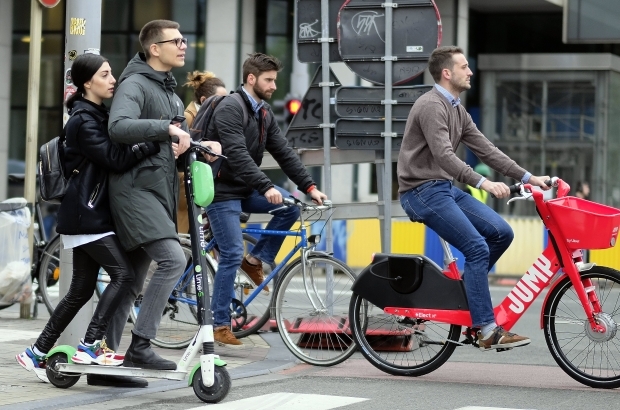- Daily & Weekly newsletters
- Buy & download The Bulletin
- Comment on our articles
Nuisance or badly needed? Brussels still divided over scooters
With a recent survey showing that nearly half (46%) of electric scooter riders admit they sometimes run a red light, Brussels continues its struggle to incorporate the increasingly popular form of micro-transport into its mobility offerings.
Other bad behaviours admitted to in the European ESRA survey from Belgian traffic safety institute Vias include riding a scooter on a footpath (61% of respondents admitted to doing so on occasion) and scooting while under the influence of alcohol (40%), both of which are illegal. Users also admitted to doubling up on riders, which was also recently forbidden in Brussels.
But while the survey results added new fuel to the ongoing debate on the presence of shared electric scooters in the Belgian capital - such scooters were recently banned in Paris - there were also significant findings about car users.
Red-light runners on scooters are quick to point out that while these stats are worse for Belgium than the European average, when it comes to poor road etiquette, scooter users are not that different from people behind the wheel of a car.
An estimated 57% of Belgians who drive a car admitted to occasionally driving faster than the maximum permitted speed on motorways at least once a month, a figure worse than the European average of 50%.
Another 55% admitted to driving too fast in built-up areas every month, compared to 48% for the European average.
One of the few areas in which Belgian drivers of cars more or less mirror their European counterparts is that of distracted driving. One in four Belgians surveyed admitted to occasionally reading a message or checking social media behind the wheel at least once a month, which is the same as the European average.
Belgian drivers were slightly better at avoiding making calls on their mobiles behind the wheel, with one in five admitting to doing so in the last month compared to the European average of 25%.
Almost one in five Belgians also admitted that they had driven a vehicle two hours after taking medication that impaired their driving ability, and Vias deplored the lack of clarity surrounding the use of medication and its link with driving.
“It’s up to the doctor and pharmacist to inform the patient of the possible impairment of driving ability,” the institute said in a statement.
“For a long time now, the Vias institute has been in favour of a colour code on the packaging of medicines indicating their possible impact on driving ability.”
Many people are under the impression that rules for driving under the influence - be that alcohol or impairing medication - do not apply the same to those on scooters, but this is not true.
“As a reminder, the legal alcohol limit of 0.5% also applies to driving an electric scooter,” Vias said. “The electric scooter is certainly not a safe mode of transport when you are under the influence of alcohol. The slightest unexpected movement can throw you off balance and cause you to fall heavily.”
ESRA is a large-scale survey in 39 countries worldwide, 22 of which are European countries. In all those countries, the same questionnaire is submitted to a representative sample of at least 1,000 road users. In Belgium, 2,000 people took part.




















Comments
The title is about electric scooters but the article is mostly about cars.
No focus here.
Electric scooters are dangerous.
One reason is they have very small wheels which makes them prone skidding and even more often, to tumbling-over on the smallest of objects or on any of the many uneven cobblestone Brussels streets.
Another reason is that they accelerate too hard and by the time a driver or rider checks the other direction of traffic, they land on him/her from the other side, the one already checked, 1 second ago, other side.
Another reason is that their riders do not differentiate between streets, bike paths, sidewalks.
Heck, they do not even differentiate between parking it standing against a wall or laying it on the ground in front of a building's exit.
So we have technical issues, more technical issues and behavioral issues.
Now as far as the speeding stats are concerned, it's either because there is "something weird" in the air in Brussels that makes drivers speed more than in other European cities, or that the speed limits are nerve-wreckingly low and thus they beggar being violated,
AND,
the newly applied street changes (direction, closures, narrowing!) have quadrupled driving distance, and time, and pollution (even for electric vehicles) to get from point A to point B. Even more frustration here, and more costs, and more phone peeking etc etc etc
As I have said time and again, we are paying (handsomely) our politicians to make our life better BUT they diligently strive to make it worse.
We should fire them! And, we should be able to do so at any time and not only during elections.
Why?
Three reasons:
1.: because by elections time, the bad decisions they have made have already become a status quo and are too costly to change.
2.: because the constituents have become numb from the constant bad decision bombardment and also, they cannot even remember ALL the nonsense they are opposed to and have never voted for.
3.: because city politicians never take clear pre-election positions on daily life issues but instead they keep fogging us up with "greater issue" mumbo-jumbo ill based idealisms.